美国最高总导演完全撤退2500名美国士兵中阿富汗在接受美国广播公司新闻部首席全球事务记者玛莎·拉德茨的独家采访时承认安全局势是“不好的”,而且塔利班美国占领该国部分地区的举动“令人担忧”
奥斯汀·斯科特·米勒将军说,他坚持自己的信念不可能是军事上的胜利者但他告诉拉德达茨,随着塔利班继续在全国各地开展军事行动,同时也在进行和平谈判,“你开始在这里创造条件,如果推动军事接管,这在未来对阿富汗不利”导致内战。
“我认为你所看到的——如果你看看安全局势——并不好,”米勒告诉拉德达茨。“阿富汗人已经认识到这不好。塔利班正在行动。”
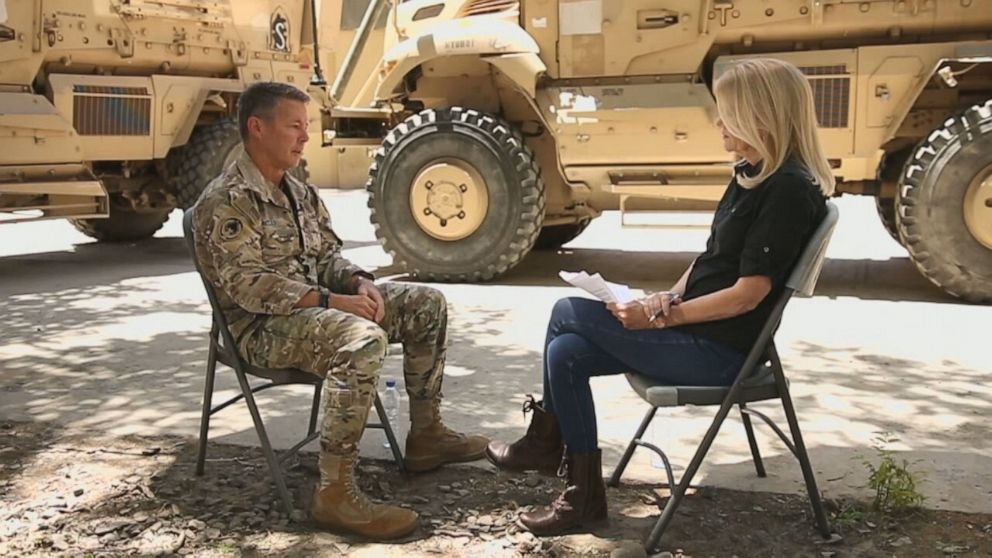
美国广播公司新闻
玛莎·拉德达茨在阿富汗采访了斯科特·米勒将军,并讨论了美国撤军的问题...
米勒解释说,虽然塔利班正在卡塔尔参加与阿富汗政府的和平谈判,并表达了支持政治解决的情绪,“但塔利班正在全国各地进行进攻行动。”
他以前说过双方都赢不了在阿富汗的军事上。
“我还是袖手旁观的那些话,”米勒说。“你开始在这里创造条件,如果推动军事接管的话,未来阿富汗的情况会不太好。
米勒说,“我们应该关注”关于塔利班暴力增加的报道,因为塔利班武装分子已经占领了阿富汗全境几十个阿富汗政府地区中心。
米勒说:“地形的丧失和地形丧失的速度必须是一个令人担忧的问题。”他指出,这可能会降低军队和平民的士气。“所以当你看着塔利班在全国各地移动时,你不想发生的是,人们失去了希望,他们相信他们现在已经有了一个既定的结论。”
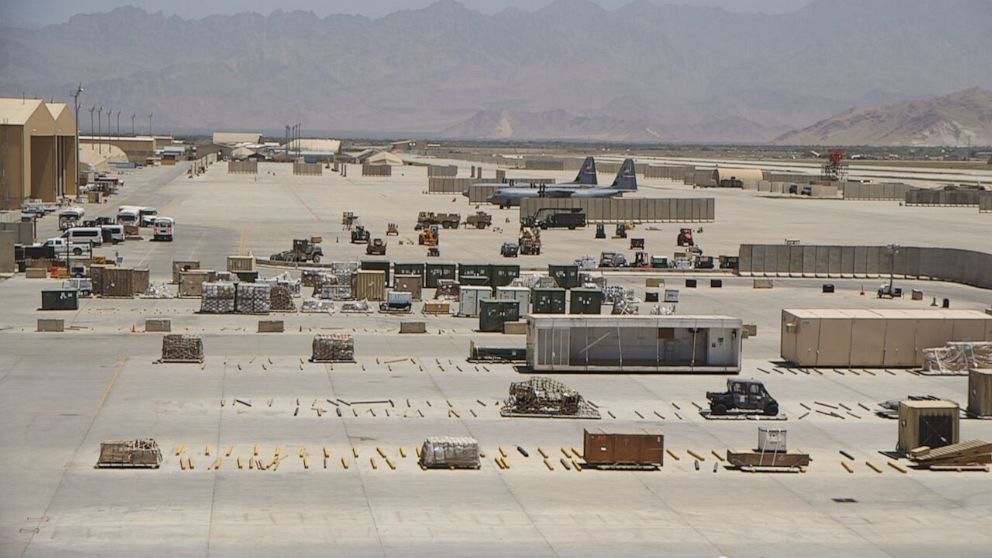
美国广播公司新闻
2021年6月23日,准备从阿富汗巴格拉姆空军基地撤军的美军。
米勒说,阿富汗新任国防部长比斯米拉·穆罕默迪“理解局势的严重性”,并正在采取行动从战略上巩固阿富汗安全部队,以继续战斗并不一定要保卫每个地区中心。
“他们需要这样做,”米勒说,“当他们继续前进时,他们必须选择他们想在哪里打击塔利班。”
米勒还表示,他理解喀布尔居民对塔利班未来可能袭击阿富汗首都的担忧。
“如果你回到塔利班的目标,他们想接管,所以在某个时候,这意味着在某个时候,他们在喀布尔,”他说。“当然,他们中的一些人还记得上一次在塔利班政权统治下的情形。”
离开巴格拉姆
美国广播公司新闻部陪同米勒前往位于喀布尔以东40英里的巴格拉姆空军基地,该基地是过去两个月里数百次空运美国军事设备和人员的主要运输中心。
“我们现在站在的地方是这些设备,它们正等着上飞机,作为我们逆行命令的一部分,它们将从阿富汗重新部署,”米勒告诉拉德达茨,他使用了军方对全面撤军的官方说法。
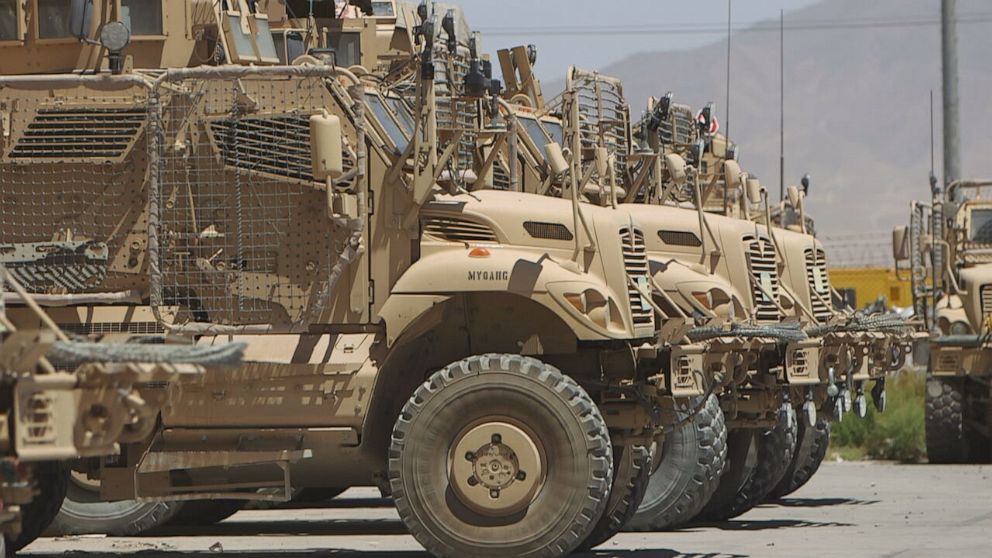
美国广播公司新闻
2021年6月23日,准备从阿富汗巴格拉姆空军基地撤军的美军。
米勒说:“这里发生的事情也发生在全国各地的其他机场,特别是在北部。”他强调,目标是安全有序地撤军,在美国和联军离开该国时保护他们。
米勒最终表示,该基地将移交给阿富汗安全部队,就像美国在该国的其他库存一样。
米勒说:“这个想法是,有设备留在这里支持他们,当然是在一个战略机场。”“但同样,我们希望确保他们有能力吸收它,并在我们前进的过程中保护它。
根据乔·拜登总统的命令,随着美国军队迅速采取行动,在9月11日前从阿富汗撤出所有美国军队,美国在阿富汗的军事装备已经有一半以上运出该国。但似乎撤军可能会比这快得多,一名美国官员告诉美国广播公司新闻,最早可能在7月份完成。
巴格拉姆的行动速度令负责该行动的经验丰富的后勤官员大开眼界。
监督撤军的后勤官员艾琳·米勒上校说:“看到东西非常光秃秃的,空空如也,有点不现实。”。“当我们继续逆行前进的时候,看到设备不见了,这真的很不现实。”
维护安全
美国在训练和装备阿富汗安全部队上已经投入了数十亿美元,现在该由他们来维护安全了。
米勒说:“我们说的是,这是阿富汗,这是他们的国家。“阿富汗安全部队必须坚守阵地。”
美国军方将继续向阿富汗部队提供财政支持,并继续援助阿富汗空军维护人员,但随着美国完成撤军,除了将驻扎在喀布尔美国大使馆的数百名人员之外,美国不会在阿富汗派驻军事人员。
美国人还将继续从波斯湾地区的国家执行“超视距”侦察任务和反恐任务,重点是基地组织和伊斯兰国组织,而不是塔利班。
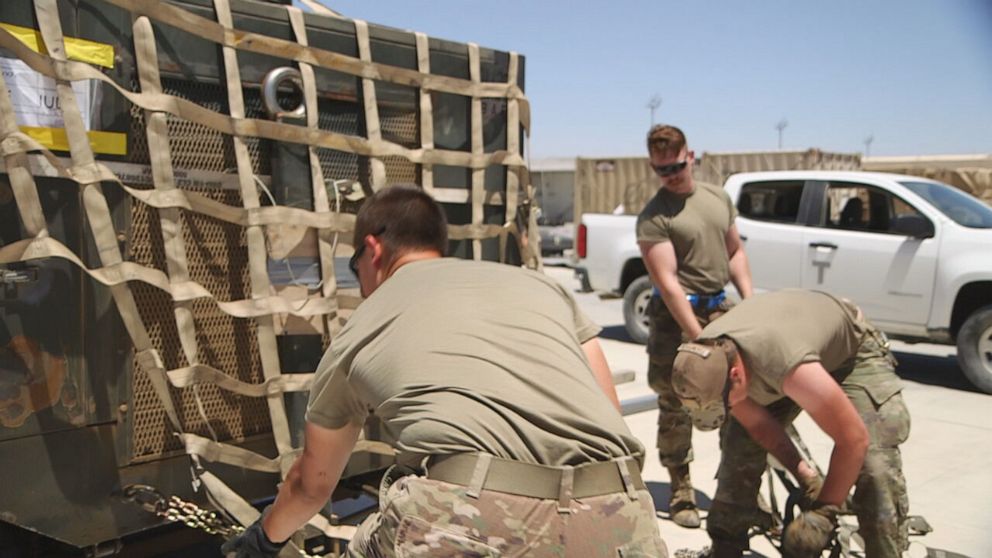
美国广播公司新闻
2021年6月23日,准备从阿富汗巴格拉姆空军基地撤军的美军。
虽然美国在撤军期间继续提供防御性空袭以支持阿富汗地面部队,但美国中央司令部的弗兰克·麦肯齐将军表示,如果这两个恐怖组织计划攻击美国本土或盟友,以后的空袭只会针对他们。
米勒赞扬了阿富汗空军的有效性,但表示美国未来进行防御性空袭的可能性将继续“在我们前进的过程中进行讨论”。
“我认为我们需要看看这是如何实现的,”他告诉拉德达茨。
在阿富汗驻扎了近20年后,美军从阿富汗撤军,这与2011年美国从伊拉克撤军形成了对比。2011年,美国从伊拉克撤军造成了安全真空,导致ISIS崛起,美国军队最终在2014年重返阿富汗。
“当我们离开这里时,你会想到伊拉克吗?当我们离开时,伊拉克发生了什么?”拉德茨问米勒。
“当然,我的意思是这是每个人都在想的,”米勒说。"这些都是我们必须做出的权衡国家利益的判断。"
有需要的朋友
米勒第一次在阿富汗服役是在2001年12月,当时他是一名特别行动指挥官,并且已经在阿富汗、伊拉克和其他地方部署了至少八次。
当米勒准备最后一次离开阿富汗时,他描述了职业和个人的复杂感受。
米勒说:“在专业方面,你看到的是——我会称之为——至少在冲突的威胁下正在进行的历史性倒退。”。“到目前为止,至少到目前为止,还没有争议。所以你看到了这一点,你知道那里正在发生的好事,看着我们的服务成员以及我们的盟友尽可能专业地这样做。”
他说,20年后,他在阿富汗发展了朋友,但“我不喜欢离开需要帮助的朋友,我知道我的朋友需要帮助。”
“随着我们继续逆行并撤回部队,我能直接向他们提供的援助越来越少,”他说。“所以这很难。”
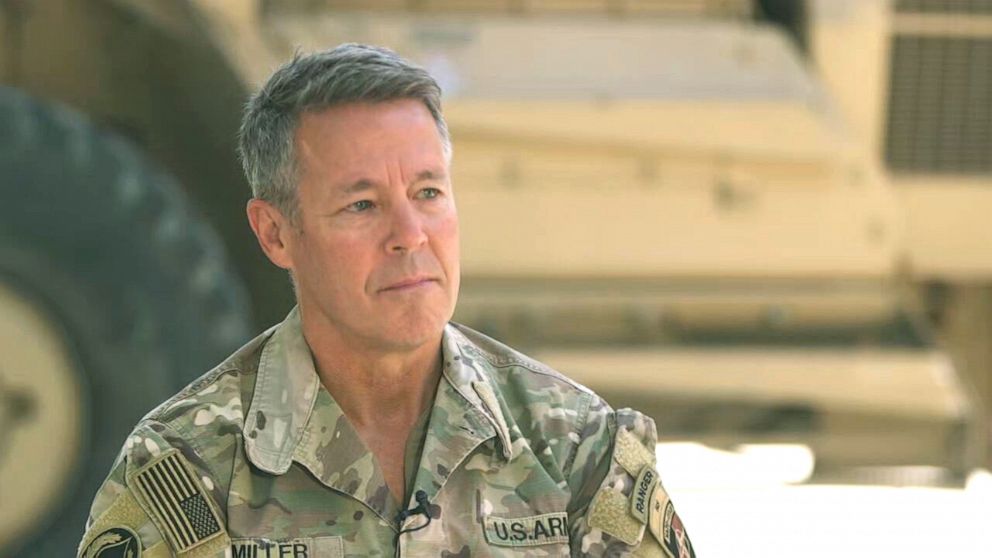
美国广播公司新闻
玛莎·拉德达茨在阿富汗采访了斯科特·米勒将军,并讨论了美国撤军的问题..
例如,他说,阿富汗国防部长穆罕默迪偶尔会要求他提供某种类型的援助——在过去几年中提供过——而且“我必须告诉他,我不能这样做。”
“这是一个艰难的行业,非常艰难,”米勒说。
“我们知道我们将不得不在某个时候离开,”他继续说道。“我不知道你能不能找到合适的时机,但是要知道你正在努力做的是,在你离开的时候,确保可以继续的安全援助确实继续下去;你保持这些线路畅通。所以即使我们讨论——我们称之为‘离开’——也不意味着关系的彻底破裂。”
阿富汗陆军特种作战司令部司令Haibatullah Alizai将军承认,阿富汗军队面临挑战,但他表示,他相信,在所有美国军队离开阿富汗后,他的部队和阿富汗将能够忍受。
“当然,我们会活下来的,”艾丽西说。“阿富汗会活下来的。”
“在过去的20年里,我们从朋友和合作伙伴那里学到了很多东西,”他说。“基于这些教训,我们将扩大和扩展我们的军队,让我们的军队变得强大,让阿富汗的局势保持不变或比今天更好。”
阿里扎伊说:“我对此非常乐观,我们真的致力于打击恐怖主义,为未来维护阿富汗的安全。”。
An inside look at the US troop withdrawal from Afghanistan: ABC News exclusive
The top U.S. general directingthe full withdrawalof all 2,500 American troops fromAfghanistanacknowledged in an exclusive interview with ABC News chief Global Affairs correspondent Martha Raddatz that thesecurity situationin the country is "not good" and that theTaliban's push to seize parts of the country is "concerning."
Gen. Austin Scott Miller said he stands by his belief that therecannot be a military victorin Afghanistan, but he told Raddatz that as the Taliban continues with its military operations across the country, while also engaging in peace talks, "you're starting to create conditions here that doesn't -- won't look good for Afghanistan in the future if there is a push for a military takeover" that couldresult in a civil war.
"I think what you're seeing -- just if you look at the security situation -- it's not good," Miller told Raddatz. "The Afghans have recognized it's not good. The Taliban are on the move."
Miller explained that while the Taliban are participating in peace talks in Qatar with the government of Afghanistan and expressing sentiments favoring a political settlement "you have an offensive operation going on across the country by the Taliban."
He has previously saidneither side can winmilitarily in Afghanistan.
"I still stand by those words," Miller said. "You're starting to create conditions here that doesn't won't look good for Afghanistan in the future if there is a push for a military takeover.
Miller said "we should be concerned" by reports of increasing Taliban violence as Taliban fighters have seized dozens of Afghan government district centers throughout Afghanistan.
"The loss of terrain and the rapidity of that loss of terrain has to be a concerning one," Miller said, noting that it can lower morale among military forces and civilians. "So as you watch the Taliban moving across the country, what you don't want to have happen is that the people lose hope and they believe they now have a foregone conclusion presented to them."
Miller said Afghanistan's new Defense Minister Bismillah Mohammadi "understands the gravity of the situation" and is moving to strategically consolidate Afghan security forces tomaintain the fightagainst the Taliban and not necessarily defend every district center.
"They're going to need to do that" Miller said, and "they're going to have to choose where they want to fight the Taliban as they continue to move forward."
Miller also said he understood concerns by residents in Kabul that the Taliban would like to attack Afghanistan's capital in the future.
"If you go back to what the Taliban's objectives are, they want to take over and so at some point that implies that at some point they are in Kabul," he said. "And certainly some of them remember what it was like the last time under with the Taliban regime."
Departing Bagram
ABC News accompanied Miller to the sprawling Bagram Air Base located 40 miles east of Kabul that is the main transportation hub for the hundreds of cargo flights that have taken out U.S. military equipment and personnel over the past two months.
"Where we're standing right now is this equipment that's waiting to get on aircraft and that will redeploy from Afghanistan as part of our order in retrograde," Miller told Raddatz, using the military's official term for the full withdrawal.
"What's happening here is also happening at other airfields around the country, particularly in the north," said Miller, who stressed that the objective is for a safe and orderly withdrawal that will protect American and coalition forces as they depart the country.
Ultimately Miller said that the base would be turned over to Afghan security forces, much as is happening with other U.S. inventory in the country.
"The idea is that there is equipment that stays here that supports them, certainly in a strategic airfield," said Miller. "But again, we're looking to make sure that they have the ability to absorb it and secure it as we go forward.
More than half of the U.S. military equipment in Afghanistan has already been shipped out of the country as the U.S. forces quickly move towards pulling out all U.S. troops from Afghanistan by Sept. 11, as ordered by President Joe Biden. But it appears that the withdrawal could be completed much sooner than that with one U.S. official telling ABC News that it could be completed as soon as July.
The pace of the operations at Bagram has been eye-opening for the experienced logistics officers in charge of the operation.
"It's a little surreal to see things very bare and empty," said Col. Erin Miller, a logistics officer overseeing the withdrawal. "And as we continue to move forward with the retrograde, seeing the equipment leave out, it truly is surreal."
Maintaining security
With all the billions of dollars the United States has invested in training and equipping Afghanistan's security forces, it will be up to them to maintain security.
"What we've said is this is Afghanistan, this is their country," said Miller. "The Afghan security forces have to hold."
The U.S. military will continue to provide Afghan forces with financial support and continued assistance for Afghan air force maintenance crews, but as the U.S. completes its withdrawal, there will not be a physical U.S. military presence in Afghanistan aside from the hundreds of personnel who will be stationed at the U.S. embassy in Kabul.
Americans will also continue to fly "over-the-horizon" reconnaissance missions and counterterrorism missions from countries in the Persian Gulf area focused on al-Qaida and the Islamic State group, not the Taliban.
While the U.S. is continuing to provide defensive airstrikes in support of Afghan ground troops during the withdrawal, U.S. Central Command's Gen. Frank McKenzie has indicated that airstrikes later will only be directed against the two terror groups if they are planning to attack the American homeland or allies.
Miller praised the effectiveness of Afghanistan's Air Force but indicated that the possibility of U.S. defensive airstrikes in the future will continue "to be discussed as we move forward."
"I think we need to see how that how that lands," he told Raddatz.
The withdrawal in Afghanistan after an almost 20-year presence has drawn comparisons to the 2011 U.S. withdrawal from Iraq, which created a security vacuum that led to the rise of ISIS and the eventual return of U.S. forces in 2014.
"Do you think about Iraq when we're leaving here and what happened in Iraq when we left?” Raddatz asked Miller.
“Absolutely, I mean that's on everybody's mind," said Miller. "These are judgments that we have to make balanced against our national interests."
Friends in need
Miller first served in Afghanistan in December, 2001 as a special operations commander and has deployed at least eight other times to Afghanistan, Iraq and other locations.
As he prepares to leave Afghanistan for the final time Miller described mixed feelings both professionally and personally.
"On the professional side, what you're seeing is a -- what I would call -- a historic retrograde being done under at least the threat of conflict," said Miller. "So far, it has not been contested, at least to date. So you see that and you know the goodness that's taking place there, watching our service members as well as our allies doing this as professionally as possible."
He said that after 20 years he has developed friends in Afghanistan, but "I don't like leaving friends in need and I know my friends are in need."
"As we continue to move down the retrograde and withdraw forces, there's less and less I can directly offer them in terms of assistance," he said. "So that's hard."
For example, he said Afghan Defense Minister Mohammadi has asked him occasionally for some type of assistance -- provided in years past -- and "there's points where I have to tell him I won't be able to do that."
"It's a tough, tough business, it is tough," said Miller.
"We knew we were going to have to leave at some point," he continued. " I don't know that you could find a right time, but so know what you are trying to do is, as you depart, ensure that the security assistance that can continue does continue; that you keep those lines open. So even as we discuss -- we call it ‘departure’ -- it doesn't mean a full break of the relationship."
Gen. Haibatullah Alizai, the commander of the Afghan Army's Special Operations Command acknowledged that there will be challenges ahead for Afghanistan's military, but he expressed confidence that his forces and Afghanistan will be able to endure after all U.S. troops have left Afghanistan.
"Absolutely, we will survive," said Alizai. "Afghanistan will survive."
"We have learned a lot from our friends and partners in the last two decades," he said. "Based on those lessons we are going to expand and extend and make our army great to make Afghanistan keep the situation in Afghanistan the same or better than today. "
"I'm really optimistic about this and we are really committed to this fight against terrorism and to keep Afghanistan safe for the future," said Alizai.






